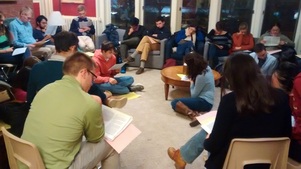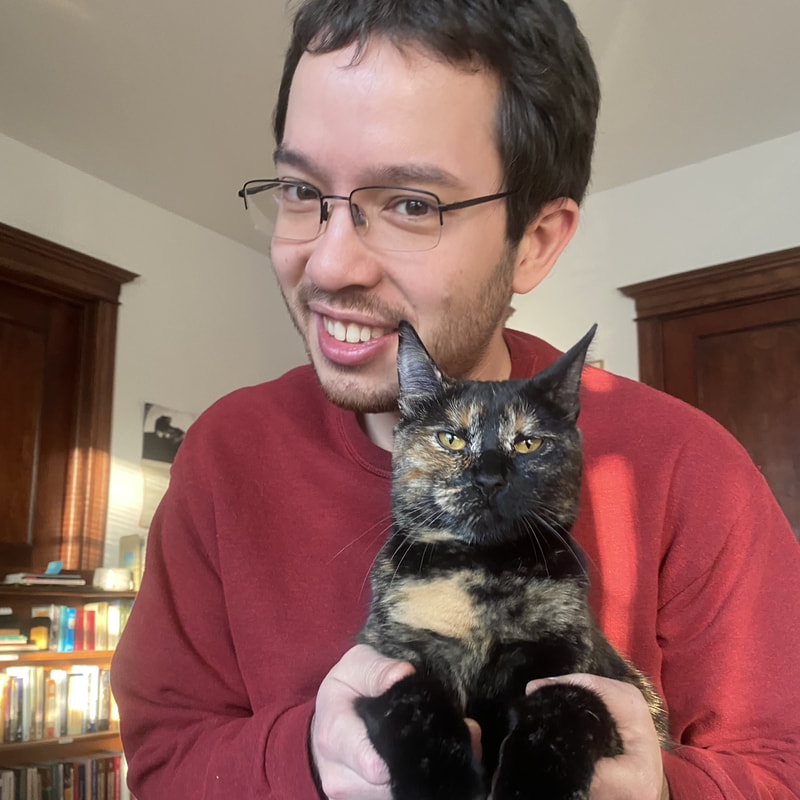|
Written for the the Calvert House, the Catholic center at the University of Chicago. Why the Calvert House? Why, indeed, the Church? But first—why such hard questions? This is, after all, a newsletter; I’m just supposed to tell you about Calvert’s recent retreat. So to recount: On a frigid Friday evening, amidst midterm exams and papers, thirty of us students gathered. We supped. We shared. We prayed. We were warmed by the food, fellowship, and faith. It was all very nice. (See the nice picture.) Why, then, such big, hard questions? Well, I’m writing for a newsletter, but I’m writing from Chicago. I’m writing from the school where famously, notoriously, ideas trump feelings, and ease doesn't cut it. Nor, in reflection, did that little retreat recount. For since that evening, I’ve realized that the experience was not only nice, but profound; not only relaxing, but empowering. And newsletter though this is, I submit that to understand this power, you have to understand my own larger struggle with Calvert. And to understand my struggle with Calvert, you have to understand my generation’s larger struggle with the Church. * * *
So for me, why Calvert? For my generation, why the Church? For, I do indeed practice. I always have. But I have never done so because of theology. No, I practice because I’ve always practiced. I practice because as my life and world rush towards the unknown, the rites and roles I have always known comfort me with consistency. Similarly, my generation does find time to practice in the Church. Well, some of my generation does. Sometimes. When we’re not too overworked. And when we do make time for the Church, we seek rest more than teaching. After all, my generation and I might need Catholic relief, but we don’t heed Catholic dogma. No, school and work charge our priorities. And secular encounters charge our consciences. You can blame the usual suspects for the latter. To pick on my own example: Personal encounters with my gay uncle and his partner, my gay aunt, my gay roommate, my gay retreat partner, my gay peers, and 21st-century America have formed my conscience for good. Thus, competing theological encounters with Church teaching—of, say, my gay friends’ and family’s “objective disorder”—have never stood a chance. And I am not alone. This year, the Pew Research Center found that 85% of Catholics aged 18 to 29 think homosexuality should be accepted. Catholic practice may get by, but increasingly, Catholic theology seems lost on the conscience of my generation. I come to Calvert, but just for comfort. Yet comfort is hardly why I came to Chicago. No, my peers and I sought Chicago on that belief in the power of ideas. We sought Chicago so that professors could shape our minds and our morals, so that we could shape our world. Still, amidst our busyness and beliefs, my generation rarely allow our faith to shape so much. Positioned thus, I fear that Calvert risks relegation to the edge of our lives. Here at Chicago, I fear that Calvert risks buffering our fundamentally intellectual identity, but not driving it. And across my generation, I fear that the Church risks offering self-help, but not empowering belief. Is that enough for Calvert? Enough for the Church? Is that enough for me? Enough for my generation? * * * This, at least, I know: Calvert’s retreat was not merely enough; it was empowering. Why? I’ve struggled with this question since that frigid Friday evening. I think I can now risk an answer. To be sure, the retreat opened with ease. We gathered, shared a meal, read from John, shared reflections, prayed—together. All this is rare for class, but standard for Calvert. All this is nice. But then, through our facilitator, we struck gold. We’d invited Duff Morton to lead our experience. Yes, Morton finds peace in the Church; but from the Church he also draws strength. As an anthropology doctoral candidate, he researches Brazil’s Landless Workers Movement, which drew force from Catholic communities and doctrine. Moreover, as a student, and thus as citizen of Chicago’s South Side, he advocates for the University to reopen a trauma center for adults. Duff rests from work through faith, but then puts his faith to work. With Duff, then, we retreatants got to work. Put at ease, we opened ourselves to big, hard questions. Secured in practice, we opened ourselves to the power of theology. Nurtured beyond sterile class, we broke rich Calvert ground. Specifically, we reflected on the theology of Fr. Gustavo Gutiérrez. We probed our worries about ourselves and our society in light of the Catholic understanding of sin as structural. And we discussed our dreams for our own work in light of the Catholic understanding of the preferential option for the poor. So, why Calvert? Why the Church? Yes, practice is part of it. Comfort is part of it. But in reflection, I realize that the retreat ultimately turned all that into to a base for theology. It turned community into engagement into empowerment. And at least for me and my peers, empowerment made the retreat. The retreat, in turn, made Calvert. And Calvert, in turn makes the Church. That’s reason enough, don’t you think? |
Professionally...[my name] at yahoo dot com
|


 RSS Feed
RSS Feed
